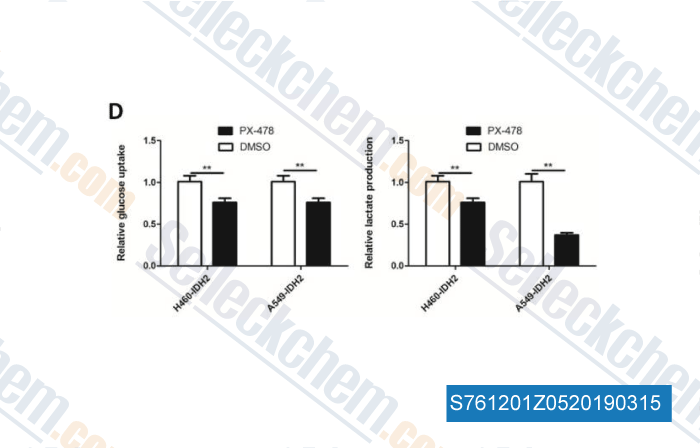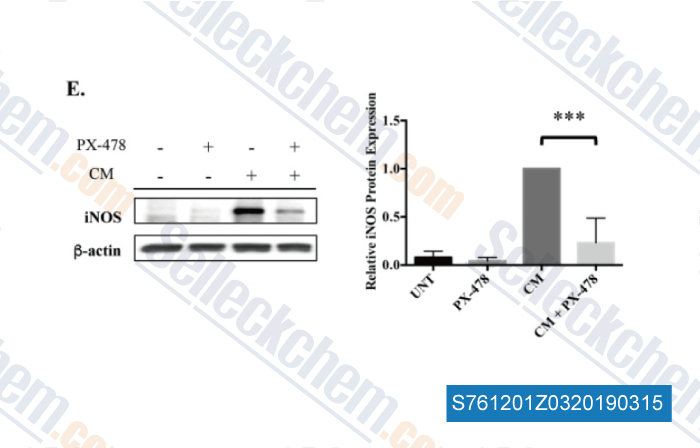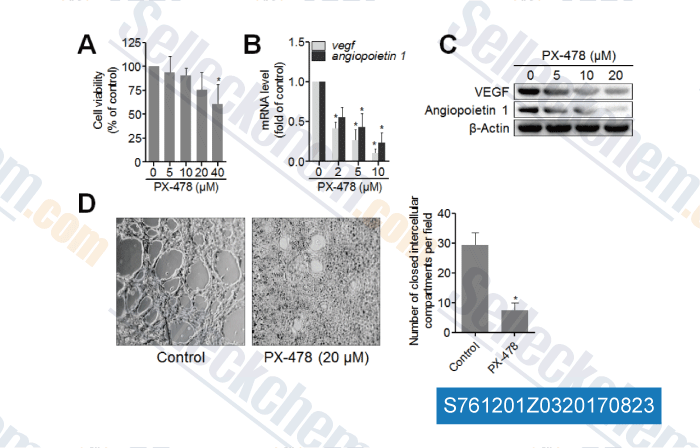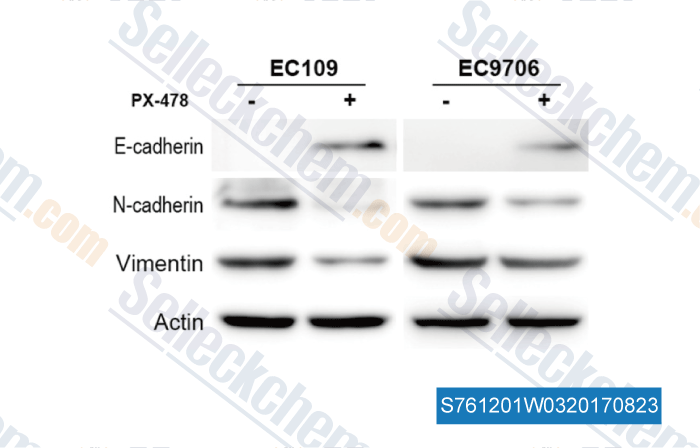|
Toll Free: (877) 796-6397 -- USA and Canada only -- |
Fax: +1-832-582-8590 Orders: +1-832-582-8158 |
Tech Support: +1-832-582-8158 Ext:3 Please provide your Order Number in the email. |
Technical Data
| Formula | C13H20Cl4N2O3 |
|||
| Molecular Weight | 394.12 | CAS No. | 685898-44-6 | |
| Solubility (25°C)* | In vitro | DMSO | 79 mg/mL (200.44 mM) | |
| Water | 79 mg/mL (200.44 mM) | |||
| Ethanol | 20 mg/mL (50.74 mM) | |||
|
* <1 mg/ml means slightly soluble or insoluble. * Please note that Selleck tests the solubility of all compounds in-house, and the actual solubility may differ slightly from published values. This is normal and is due to slight batch-to-batch variations. * Room temperature shipping (Stability testing shows this product can be shipped without any cooling measures.) |
||||
Preparing Stock Solutions
Biological Activity
| Description | PX-478 2HCl is an orally active, and selective hypoxia-inducible factor-1α (HIF-1α) inhibitor. PX-478 2HCl induces apoptosis and has anti-tumor activity. Phase 1. | |
|---|---|---|
| Targets |
|
|
| In vitro | PX-478 lowers HIF-1α protein levels and HIF-1 transactivation in hypoxia and in normoxia in a variety of cancer cell lines, but has a more pronounced effect on translation of proteins, such as HIF-1α in hypoxia. [2] PX-478 also enhances the radiosensitivity of prostate carcinoma PC3 cells. [3] |
|
| In vivo | In HT-29 human colon cancer xenografts, PX-478 suppresses HIF-1alpha levels and inhibits the expression of HIF-1 target genes including vascular endothelial growth factor and the glucose transporter-1. In addition, PX-478 (100 or 120 mg/kg i.p.) also shows antitumor activity including cures against several established human tumor xenografts that is related to the levels of HIF-1α. [1] In high-fat-diet mice, PX-478 causes reduced fibrosis and fewer inflammatory infiltrates in their adipose tissues. [4] |
Protocol (from reference)
| Cell Assay: |
|
|---|---|
| Animal Study: |
|
References
Customer Product Validation

-
Data from [Data independently produced by , , Theranostics, 2018, 8(15):4050-4061]

-
Data from [Data independently produced by , , Free Radic Biol Med, 2018, 130:278-287]

-
Data from [Data independently produced by , , Br J Pharmacol, 2017, 174(5):409-423]

-
Data from [Data independently produced by , , Am J Cancer Res, 2017, 7(5):1198-1212]
Selleck's PX-478 2HCl has been cited by 87 publications
| Rapamycin Increases the Development Competence of Yak (Bos grunniens) Oocytes by Promoting Autophagy via Upregulating 17β-Estradiol and HIF-1α During In Vitro Maturation [ Animals (Basel), 2025, 15(3)365] | PubMed: 39943135 |
| Oxygen enhances antiviral innate immunity through maintenance of EGLN1-catalyzed proline hydroxylation of IRF3 [ Nat Commun, 2024, 15(1):3533] | PubMed: 38670937 |
| Wild-type IDH2 is a therapeutic target for triple-negative breast cancer [ Nat Commun, 2024, 15(1):3445] | PubMed: 38658533 |
| Single-embryo transcriptomic atlas of oxygen response reveals the critical role of HIF-1α in prompting embryonic zygotic genome activation [ Redox Biol, 2024, 72:103147] | PubMed: 38593632 |
| Spring viremia of carp virus infection induces hypoxia response in zebrafish by stabilizing hif1α [ J Virol, 2024, e0149124.] | PubMed: 39601573 |
| Integrin α6β4 Upregulates PTPRZ1 Through UCHL1-Mediated Hif-1α Nuclear Accumulation to Promote Triple-Negative Breast Cancer Cell Invasive Properties [ Cancers (Basel), 2024, 16(21)3683] | PubMed: 39518121 |
| Lactate Promotes Hypoxic Granulosa Cells' Autophagy by Activating the HIF-1α/BNIP3/Beclin-1 Signaling Axis [ Genes (Basel), 2024, 16(1)14] | PubMed: 39858561 |
| HIF1A contributes to the survival of aneuploid and mosaic pre-implantation embryos [ bioRxiv, 2024, 2023.09.04.556218] | PubMed: 39071426 |
| Targeting PLOD2 suppresses invasion and metastatic potential in radiorecurrent prostate cancer [ BJC Rep, 2024, 2(1):60] | PubMed: 39184453 |
| PD-1 instructs a tumor-suppressive metabolic program that restricts glycolysis and restrains AP-1 activity in T cell lymphoma [ Nat Cancer, 2023, 4(10):1508-1525] | PubMed: 37723306 |
RETURN POLICY
Selleck Chemical’s Unconditional Return Policy ensures a smooth online shopping experience for our customers. If you are in any way unsatisfied with your purchase, you may return any item(s) within 7 days of receiving it. In the event of product quality issues, either protocol related or product related problems, you may return any item(s) within 365 days from the original purchase date. Please follow the instructions below when returning products.
SHIPPING AND STORAGE
Selleck products are transported at room temperature. If you receive the product at room temperature, please rest assured, the Selleck Quality Inspection Department has conducted experiments to verify that the normal temperature placement of one month will not affect the biological activity of powder products. After collecting, please store the product according to the requirements described in the datasheet. Most Selleck products are stable under the recommended conditions.
NOT FOR HUMAN, VETERINARY DIAGNOSTIC OR THERAPEUTIC USE.
